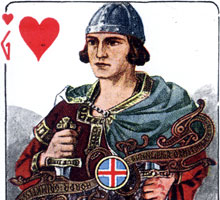Islenzk Spil
This historical Icelandic deck was first published in c.1930 and shows the native Icelandic Vikings of some thousand years ago rendered in a romantic naturalistic style.

‘Islenzk Spil’ ~ Historical Icelandic Playing Cards
Icelandic culture is founded upon the nation's Norse heritage. Most Icelanders are descendants of Norse and Gaelic settlers. This historical Icelandic deck was first published in c.1930 and shows the native Icelandic Vikings of some thousand years ago with stern expressions but rendered in a romantic naturalistic style. Their names are given in Icelandic lettering in the ornament separating each end of the design, which also includes Viking motifs.
Tryggvi Magnússon (1900-1960) graduated from secondary school in Akureyri in 1919 and then pursued studies in Copenhagen for two years. Then he went to New York League of Art 1921-1922 and studied portrait making. Between 1922-1923 he pursued the study of painting in Dresden. Tryggvi was one of the founders of the Association of Icelandic Graphic Designers and he also designed Icelandic Chess Playing Cards printed by Alf Cooke in 1942.

Above: ‘Islenzk Spil’ ~ Historical Icelandic Playing Cards with double-ended illustrations designed by Tryggvi Magnússon (1900-1960) and first published in 1930. 52 cards + Joker + Bridge Score cards in cardboard box. There have been several editions of the deck and this one is probably c.1940 after Magnus Kjaran, whose name appears on the box, had bought the rights. The indices on the numeral cards are not consistent with those on the court cards. More recent editions of this deck have a yellow background. The Joker depicts Hreiðarr Heimski, Hreidarr the Fool, a character from Icelandic literature.
• See also: Icelandic Chess Playing Cards (also designed by Tryggvi Magnússon).

By Simon Wintle
Member since February 01, 1996
I am the founder of The World of Playing Cards (est. 1996), a website dedicated to the history, artistry and cultural significance of playing cards and tarot. Over the years I have researched various areas of the subject, acquired and traded collections and contributed as a committee member of the IPCS and graphics editor of The Playing-Card journal. Having lived in Chile, England, Wales, and now Spain, these experiences have shaped my work and passion for playing cards. Amongst my achievements is producing a limited-edition replica of a 17th-century English pack using woodblocks and stencils—a labour of love. Today, the World of Playing Cards is a global collaborative project, with my son Adam serving as the technical driving force behind its development. His innovative efforts have helped shape the site into the thriving hub it is today. You are warmly invited to become a contributor and share your enthusiasm.
Related Articles

Polish Kings and Queens – red deck
Polish kings and queens plus the court jester, illustrated in a distinctive style inspired by histor...

Ukraine playing cards
Historical figures from Ukraine’s past in a familiar Piatnik style.

Baraja de Juan Martín Zamorano
Deck inspired by El Pendón de los Zamorano, a military pennant dating from 1501, published by Priego...

Jeu Numismatique
European coins of all periods replace the traditional courts and pips.

Mexican ethnic playing cards
Mexican ethnic groups depicted on playing cards by Fábrica de Naipes Cuauhtemoc.

Seminole Wars deck
Seminole Wars deck by J. Y. Humphreys, Philadelphia, c.1819.

Ubo cards
Traditional Ubo cards from the Philippines made from tree bark.

Gibson’s History of England
History without tears for young and old, 1920s.

Historical Characters
Double-ended deck with historical characters and jacks as jesters by Daveluy, c.1850.

Motherpeace Round Tarot
An original and imaginative feminist tarot invoking matriarchal Goddess energy.

Colonial Art
A collection of 53 pieces of art showcasing detailed scenes from early American colonial life.

English cards from the reign of Charles II
This article explores a historic pack of English playing cards from circa 1675, likely used by King ...

Le Roi bridge
Reprint of a Piatnik (Budapest) pack of 1927 with Hungarian historical figures and scenic aces.

Sweden playing cards
Named characters from Swedish history.

Romania playing cards
Romanian voivodes and their wives from the 15th and 16th centuries.

Le jeu des 7 Familles ’Utuafare
Colourful Happy Families game from Tahiti depicting costumes from different archipelagoes.
Most Popular
Our top articles from the past 28 days

